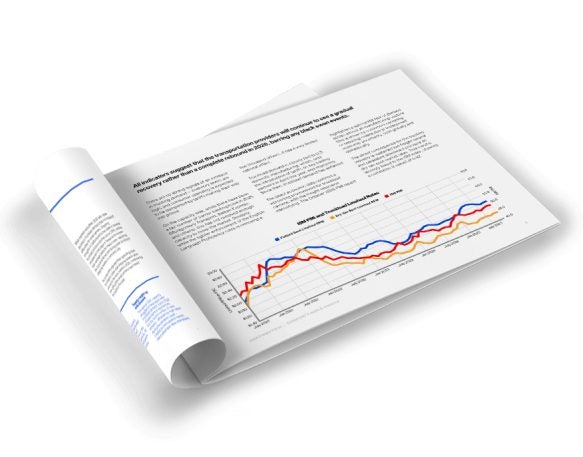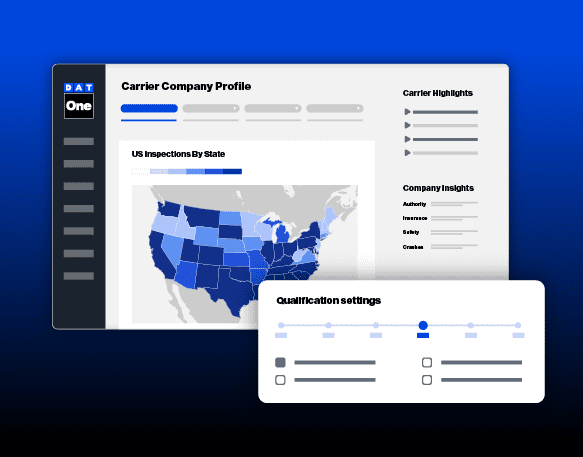
Choosing the best carriers: From RFPs to network growth
Carriers are the backbone of shipping operations, ensuring goods reach their destinations both efficiently and cost-effectively. Choosing the right carrier isn’t just about getting packages delivered on time; it’s about optimizing service quality and keeping operational costs in check. With so much on the line, shippers need reliable tools to evaluate carriers and make data-driven decisions that can enhance their shipping networks.
That’s where DAT iQ can help. This platform offers invaluable insights into carrier performance and cost, helping shippers identify the best partners for their needs. By providing detailed analytics, DAT iQ empowers shippers to make informed choices, streamline operations, and ultimately boost efficiency. So, whether you’re looking to refine your current network or expand it with new carriers, mastering the art of carrier selection and evaluation is the first crucial step.
Annual RFPs and mini-bids
When it comes to awarding bids through annual requests for proposals (RPFs) and mini-bids, choosing the right transportation providers is vital for both cost efficiency and service quality. Don’t just search for the lowest bidder—find carriers that deliver reliable service at a competitive price. DAT iQ can play a crucial role in this process by providing shippers with the data they need to make a confident decision.
With Network Analytics and Rate Analytics from DAT iQ, shippers can evaluate their current carriers and lanes to determine which ones are performing well and which might be falling short. Comparing these performance metrics and costs against market data—often referred to as the “market delta”—shippers gain valuable insights into whether their current carriers provide good value or if there are opportunities for negotiation.
This kind of analysis is essential for making strategic decisions during the RFP process, ensuring that every bid awarded contributes to the overall efficiency and profitability of the shipping operation.
When shippers need to explore alternative carriers or lanes, tools from Network Analytics like LaneMakers or Carrier Select can provide deeper insights and help identify the best options available in the market.
For more details, check out “The Ultimate Guide: An In-Depth Look at Shipper RFP Best Practices.”
Expanding networks
As industry demands evolve, shippers must adapt their carrier networks to stay competitive. Expanding a carrier network involves strategically selecting the right partners that align with the company’s operational goals and customer service standards. A thoughtful approach to network expansion can significantly improve service quality, cost efficiency, and overall customer satisfaction.
Shippers must evaluate carriers beyond basic criteria to make informed decisions, diving into performance metrics, reliability, and their ability to meet specific needs. DAT iQ provides a vital look into carrier performance, enabling shippers to analyze key metrics like on-time delivery rates, claims ratios, and cost efficiency.
Additionally, DAT iQ allows for direct comparisons with market data, providing a clear view of how carriers measure up against industry standards. This is essential for identifying those that not only meet expectations but also have the potential to make a long-term impact on optimizing carrier networks.
Performance and cost analysis
Analyzing carrier performance requires a comprehensive approach, focusing on key factors like on-time delivery rates, damage or loss incidents, and overall reliability. But performance is only part of the equation—cost is just as critical. Identifying carriers that drive up expenses through high rates or surcharges helps shippers streamline operations and manage resources more effectively. Carriers that underperform or contribute to rising costs can quickly impact profitability and supply chain efficiency.
DAT equips shippers with powerful tools to assess both performance and cost metrics. With detailed, easy-to-digest reports, shippers can quickly identify trends and pinpoint issues like recurring delays, frequent claims, or unexpected cost spikes. By offering a transparent view of each carrier’s performance in relation to market benchmarks, DAT empowers shippers to recognize which carriers provide the best value and which may be affecting efficiency.
Armed with this insight, shippers can make informed decisions—whether renegotiating contracts, shifting volumes to better-performing carriers, or removing underperformers from their network. This strategic approach not only helps reduce costs but also enhances service quality and strengthens the carrier network overall.
Practical applications and benefits
Leveraging data-driven insights is essential for shippers aiming to optimize operations and expand their networks. Here are a few scenarios that illustrate how using DAT iQ can lead to successful carrier selection and network growth, ensuring cost efficiency and high service standards:
Negotiating better rates
Consider a shipper noticing steady increases in shipping costs, even though their shipping volume and service requirements haven’t changed. Using DAT iQ, the shipper can analyze their carriers and uncover that several are charging rates well above the market average.
Armed with this data, the shipper can confidently approach those carriers to renegotiate terms, leading to more competitive rates and significant cost savings. And if renegotiations don’t succeed? No problem. The shipper can rely on tools like LaneMakers or Carrier Select to find carriers offering better rates, ensuring their network remains both cost-effective and reliable.
Identifying underperforming carriers
Now, let’s consider a different scenario. A shipper starts getting complaints about late deliveries, which is hurting customer satisfaction. To figure out what’s going wrong, they use DAT iQ to check on their carriers’ performance. The data quickly highlights that one of their main carriers is consistently missing delivery windows. With this knowledge, the shipper can choose to work with that carrier to boost their performance or switch them out for a more dependable partner. Taking this kind of proactive approach not only improves service quality but also helps maintain a solid reputation by always meeting customer expectations.
Growing smart with new partners
Think about a shipper who’s ready to break into a new market. They need carriers that can handle specific service needs, like fast shipping or specialized handling. With DAT iQ, the shipper can spot several carriers that operate in the target region and have a strong track record of reliability and cost-effectiveness.
By comparing these carriers against market data and their current network’s performance, the shipper can confidently bring on new partners that fit perfectly with their expansion plans. This kind of strategic growth ensures that the network stays strong and ready to take on new business without sacrificing quality or cost control.
Build a superior carrier network with DAT iQ
Selecting and evaluating carriers doesn’t have to be a daunting task. With the right tools and a strategic approach, you can make decisions that strengthen your network and drive success. DAT iQ is a robust platform that helps you keep your finger on the pulse of your carrier performance and costs.
So, if you’re ready to take your carrier selection process to the next level, it might be time to explore what DAT iQ has to offer.
FAQs
A few things you might be asking yourself
Selecting carriers during the RFP process involves evaluating both cost and performance. Start by defining your shipping needs and service requirements. Use data-driven tools like DAT iQ to analyze carriers’ past performance, focusing on reliability, on-time delivery rates, and cost-effectiveness. Look for carriers that align with your company’s goals and have a proven track record in similar lanes. Consider conducting mini-bids for specific needs or lanes to find the best value. Finally, maintain open communication with potential carriers to ensure they can meet your expectations and provide flexibility for future needs.
Evaluating carrier performance requires a systematic approach. Key performance indicators (KPIs) to monitor include on-time delivery rates, transit times, damage rates, claims ratios, and overall reliability. Additionally, regularly review carrier performance reports to identify any trends or areas for improvement, and engage with your carriers to discuss performance metrics and set clear expectations. This ongoing evaluation process ensures you are working with carriers that consistently meet your service standards and contribute to a smooth supply chain.
Expanding your carrier network while maintaining service quality involves strategic planning and careful evaluation of new partners. Start by identifying your specific needs, such as regional coverage or specialized services. Then, compare these carriers against your existing network to ensure they meet or exceed your service standards. Focus on building strong relationships with new carriers to ensure alignment with your operational goals. By making data-driven decisions, you can confidently expand your network without compromising on service quality or cost control.
Mini-bids are smaller, more targeted bidding processes used by shippers to address specific needs or lanes, often on a shorter timeline than annual RFPs. While annual RFPs involve a comprehensive review of all carrier contracts and are typically conducted once a year, mini-bids allow shippers to quickly respond to changes in demand or market conditions by seeking competitive bids for select routes or services. This flexibility enables shippers to optimize their carrier network in real-time, adjust rates based on current market conditions, and ensure they are always working with carriers that offer the best value for specific needs.
Hundreds of North American shippers and brokers representing over $80B in annual transportation spend use DAT iQ Benchmark to compare their costs. In order to benchmark their performance, they contribute data directly to DAT, which is verified to ensure accuracy and reliability. Data contributors are always anonymous, so you can feel safe that your valuable information is never compromised.
Evaluate carriers confidently with DAT iQ
With DAT iQ, you can make data-driven decisions that optimize your carrier selection, improve service quality, and expand your network efficiently. Don’t leave your shipping strategy to chance—use DAT iQ to build a reliable, cost-effective carrier network that meets your business needs. Start making smarter choices today and see the difference in your bottom line. Explore DAT iQ now and take the first step towards building a superior carrier network.




